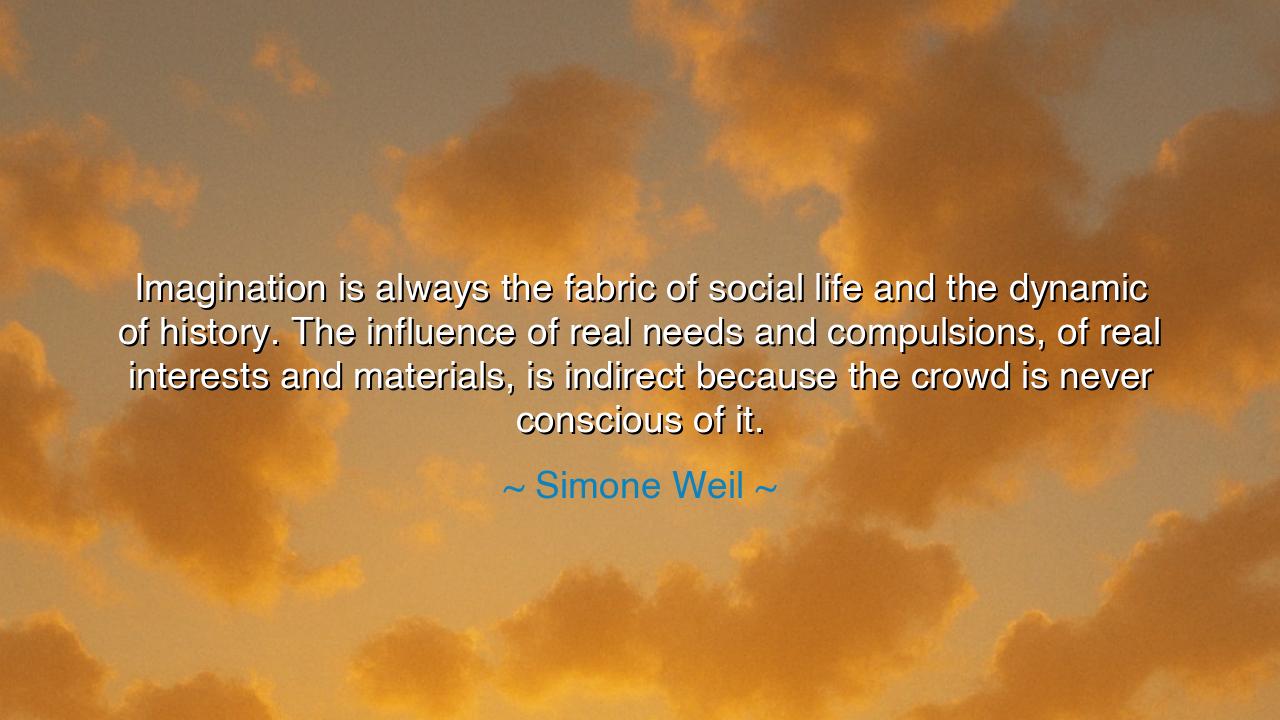
Imagination is always the fabric of social life and the dynamic
Imagination is always the fabric of social life and the dynamic of history. The influence of real needs and compulsions, of real interests and materials, is indirect because the crowd is never conscious of it.






“Imagination is always the fabric of social life and the dynamic of history. The influence of real needs and compulsions, of real interests and materials, is indirect because the crowd is never conscious of it.” – Simone Weil
Thus spoke Simone Weil, the mystic and philosopher whose mind burned like a hidden flame in the storm of the twentieth century. In this profound reflection, she unveils a truth that transcends the borders of philosophy and enters the realm of prophecy. She declares that it is not merely necessity—the hunger for food, the thirst for wealth, or the pursuit of power—that shapes human history, but imagination, that divine faculty through which people dream, believe, and act. The visible movements of civilization—wars, revolutions, empires—are but shadows cast by the unseen forces of collective imagination.
The origin of this thought lies in Weil’s lifelong meditation on human suffering and social order. She saw that history is not ruled by logic or material need alone. Nations rise and fall not only because of scarcity or ambition, but because of the myths they tell themselves—the visions that bind their people together. The poor may revolt not merely because they are hungry, but because they have imagined a better world. The conqueror may march not for resources, but for glory—the imagined immortality of empire. Thus, imagination is the fabric of all social life: it weaves invisible threads of meaning through the actions of men, guiding them like destiny.
Consider the story of the French Revolution, born not only from poverty and injustice, but from an idea—Liberté, Égalité, Fraternité. That idea, that imagined order of freedom and equality, was more powerful than any army. The people of France rose not simply to fill their bellies, but to fulfill a dream. And though the revolution descended into chaos and blood, its imagination reshaped the world forever. In that vision of liberty, the people found meaning; in that meaning, they found strength. It was the myth—the imagined belief in a just society—that drove them, not the mere facts of material life.
Weil’s words remind us that the crowd is never conscious of what truly moves it. The people act under symbols, slogans, and stories whose roots they do not see. The merchant may think he seeks profit, but he is moved by the myth of prosperity. The soldier may think he fights for safety, but he is driven by the myth of honor. The politician may claim to serve the public, but he is sustained by the myth of power. Meanwhile, the true forces of history—the deep, invisible currents of imagination—flow beneath their awareness. The material causes of history are real, yes, but they are indirect; it is the dream that animates them.
Thus, imagination is both creation and destruction. It gives birth to beauty and war, to art and tyranny. The same fire that inspired Michelangelo to paint the heavens also inspired emperors to believe themselves divine. The same dream that led men to the stars led others to build bombs. Weil understood this duality: imagination is the dynamic of history, for it moves humanity forward—but whether toward enlightenment or ruin depends on the wisdom of the dreamers. Without imagination, there is stagnation; with false imagination, there is madness. Humanity’s challenge is not to destroy the imagination, but to purify it.
In her wisdom, Weil also offers a warning. When society loses its awareness of imagination—when it mistakes myths for truth—it becomes enslaved by its own creations. History, then, becomes a cycle of unconscious repetition, driven by unexamined desires. Only by recognizing that imagination governs our collective life can we begin to shape it consciously. For those who rule without understanding this truth become tyrants of accident; and those who follow without questioning become prisoners of illusion.
So, my child of tomorrow, learn from the voice of Simone Weil: guard your imagination, for it is the loom upon which history is woven. The world you see is born first in the dreams of men. Examine the myths you live by—whether of nation, progress, or power—and ask whether they lead toward truth or toward darkness. Be conscious of what moves you, for most are not. Use your imagination not to escape reality, but to transform it. For as Weil teaches, history is not merely the record of what has been done, but the ever-turning wheel of what is imagined—and only those who dream with awareness will steer it toward the light.






AAdministratorAdministrator
Welcome, honored guests. Please leave a comment, we will respond soon